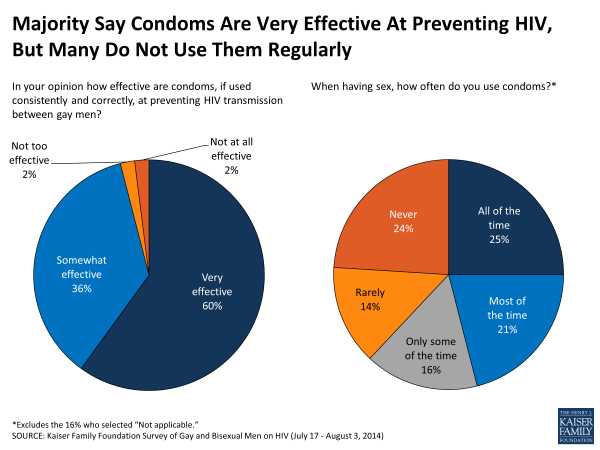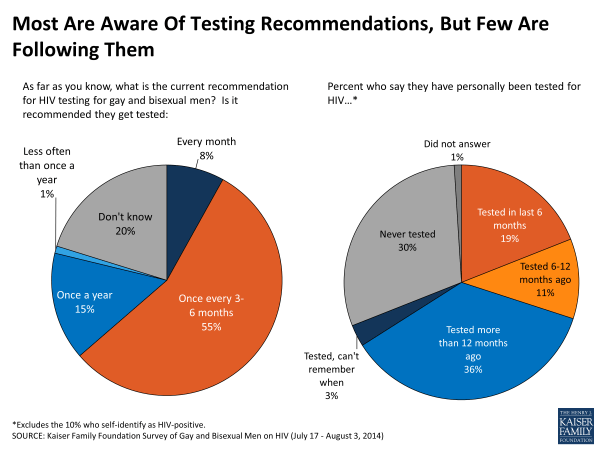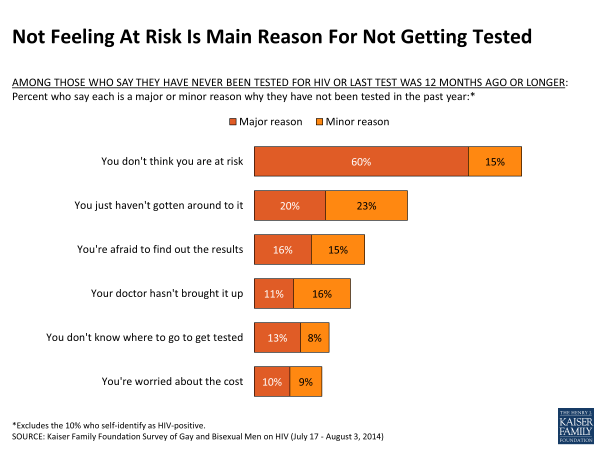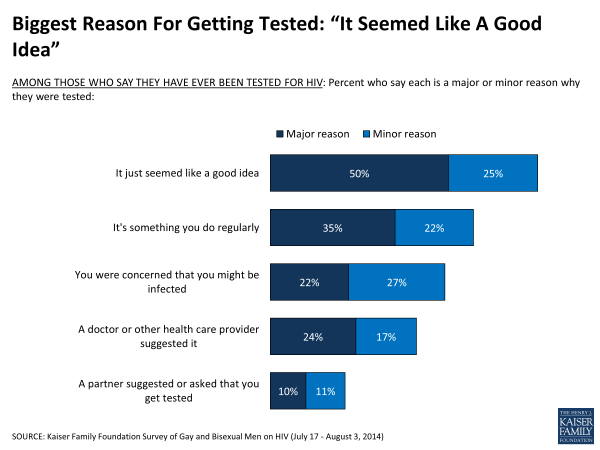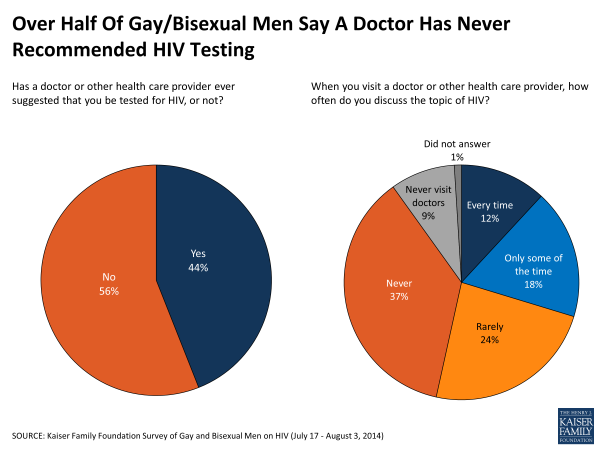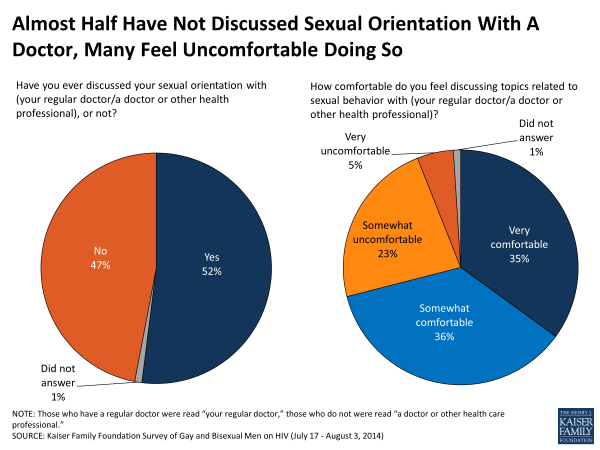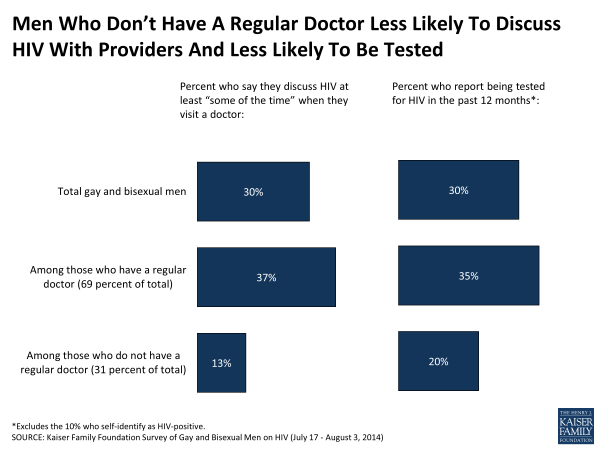HIV/AIDS In The Lives Of Gay And Bisexual Men In The United States
Section 4: Condom Use And HIV Testing
Attitudes And Reported Behaviors About Condoms
According to the CDC, when used consistently and correctly, condoms are highly effective at preventing the spread of HIV and many other sexually transmitted diseases.1 Six in ten gay and bisexual men (60 percent) consider condoms to be “very” effective at preventing HIV transmission between gay men, and most of the remainder (36 percent) say they are “somewhat” effective. Still, fewer than half (46 percent) say they use condoms “all of the time” or “most of the time” when having sex, and nearly a quarter (24 percent) say they never use condoms.2
Notably, gay and bisexual men who are members of racial and ethnic minority groups are more likely than their white counterparts to say they use condoms all or most of the time (61 percent versus 39 percent).
Attitudes And Reported Behaviors About HIV Testing
The CDC recommends that gay and bisexual men be tested for HIV at least annually and that those who are sexually active may benefit from more frequent testing (every 3 to 6 months)3, a recommendation already made by many health departments, particularly in areas where gay and bisexual men have been hard hit by HIV. Nearly two-thirds of gay and bisexual men say that testing is recommended more than once annually, including 55 percent who say it should be every 3-6 months and 8 percent who say it should be every month. Men who identify as gay are more likely than those who identify as bisexual to think testing should be at least every 3-6 months (70 percent versus 50 percent).
Relatively few gay and bisexual men report getting tested as regularly as is often advised. While seven in ten say they have gotten an HIV test at some point in their lives, just one in five (19 percent) say they were tested within the past 6 months. Another one in nine (11 percent) report having been tested between 6 and 12 months ago, while 36 percent say their last test was over a year ago and 3 percent can’t remember when they were last tested. Fully three in ten (30 percent) say they have never been tested for HIV, a share that rises to 44 percent among those under age 35.4
Gay and bisexual men who identify as white are more likely than men of color to say they have ever been tested for HIV (74 percent versus 59 percent), though the share that reports being tested within the past 6 months is similar for both groups (18 percent among white men, 23 percent among men of color).
Among those who have never been tested or who have let more than a year elapse since their last test, by far the most common reason is not feeling at risk (60 percent say this is a major reason). Fewer say they just haven’t gotten around to it (20 percent), they were afraid to find out the results (16 percent), they didn’t know where to go to get tested (13 percent), their doctor never brought it up (11 percent), or they were worried about the cost (10 percent).
Among gay and bisexual men who have been tested for HIV, the most common reason they say they decided to do so was “it just seemed like a good idea” (50 percent say this is a major reason), followed by “it’s something you do regularly” (35 percent), having a test suggested by a doctor (24 percent), being concerned about being infected (22 percent), and a suggestion or request from partner that they get tested (10 percent).
Among those who have been tested, six in ten (60 percent) say their most recent test was conducted as part of another health visit such as a regular check-up, while a third (33 percent) say they went to a doctor or clinic specifically to get an HIV test.
Lack Of Communication With Doctors As A Barrier To Testing And Care
Doctors play an important role in getting people tested for HIV and getting them into treatment, yet more than half of gay and bisexual men (56 percent) say that no doctor or health care provider has ever suggested they get tested. While three in ten (30 percent) say they discuss the topic of HIV at least “some of the time” when they visit a doctor, six in ten (61 percent) say they “rarely” or “never” discuss the topic with any health care provider.
Lack of open communication with doctors may be a barrier to more gay and bisexual men getting the health care they need, including HIV testing. Almost half (47 percent) say they’ve never discussed their sexual orientation with a doctor or other health care professional. While most (71 percent) say they feel “very” or “somewhat” comfortable discussing topics related to sexual behavior with their doctor, almost three in ten (28 percent) say they feel uncomfortable doing so. As noted above, 15 percent say that they’ve received poor treatment from a health care professional at some point because of their sexual orientation.
Bisexual men are even less likely to report openly communicating with their doctors about HIV and sexual behavior: 67 percent say they’ve never discussed their sexual orientation with a health professional, 45 percent say they feel uncomfortable discussing sexual behavior with their doctor, 77 percent say they rarely or never talk about HIV with doctors, and 72 percent say no health care provider has ever suggested they be tested for HIV.
Lack of access to health care providers may also be a barrier to more frequent HIV testing and health care for some gay and bisexual men. Three in ten (31 percent) either say they don’t have a regular place to go for medical care or that they don’t have a regular physician, and these men (who tend to be younger, lower-income, and more racially diverse) are less likely to report discussing HIV with doctors, and less likely to report getting tested.

